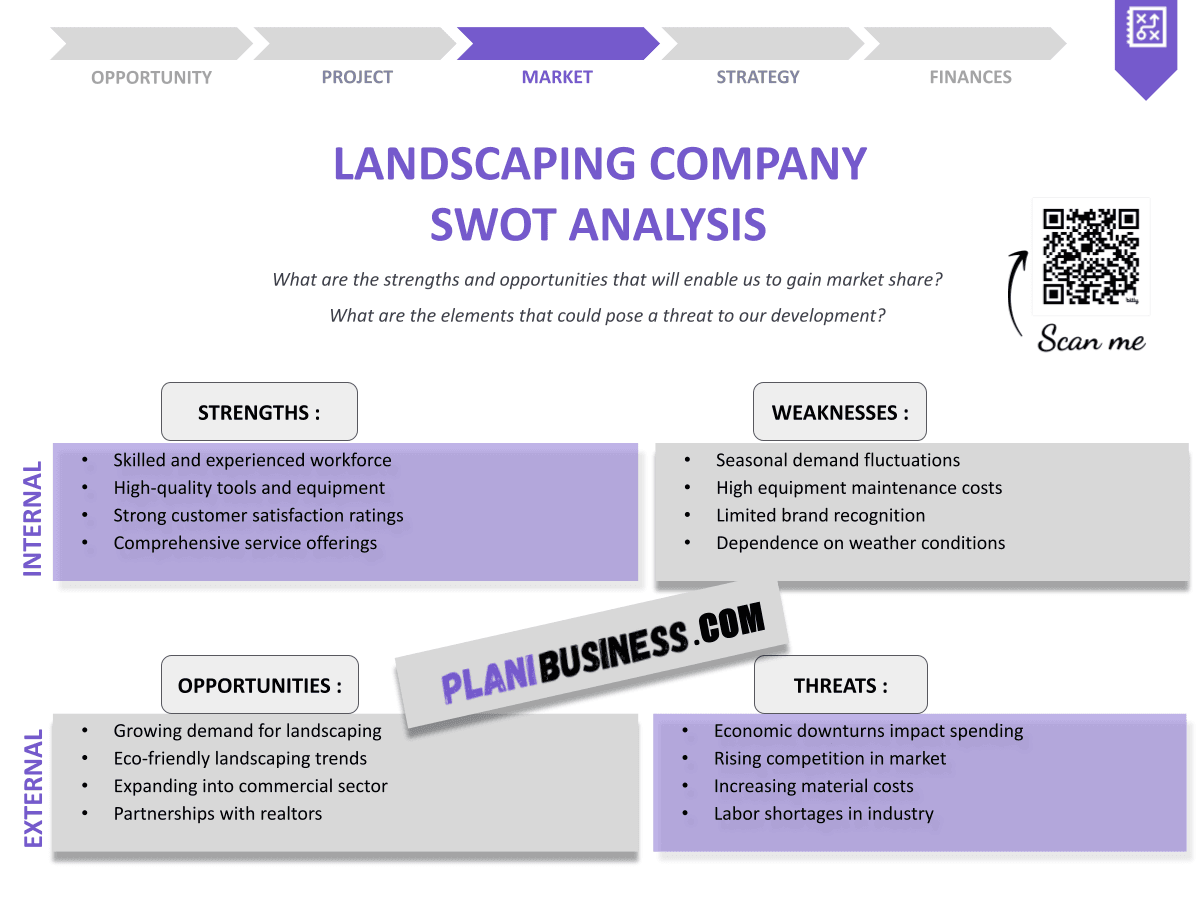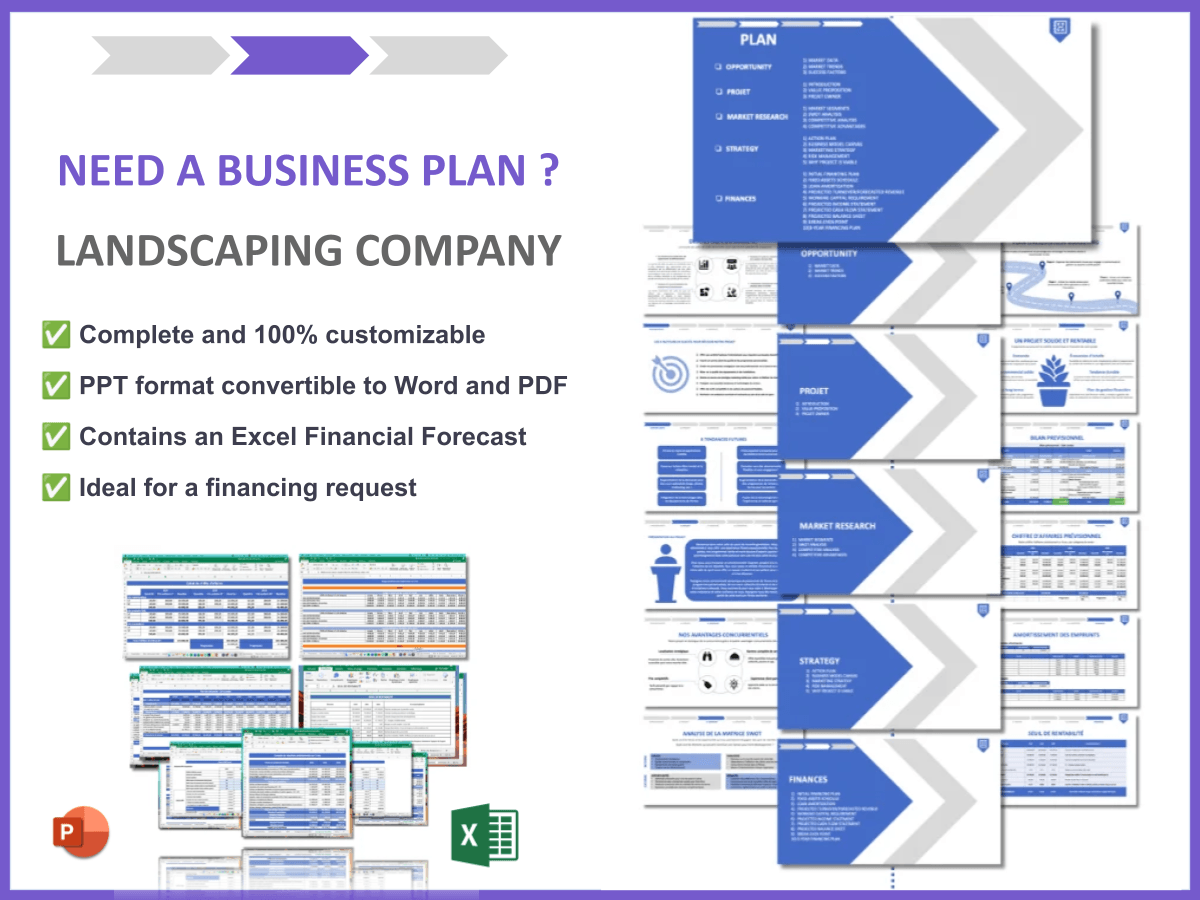Why Should You Have a SWOT Analysis for a Landscaping Company?
Are you considering a landscaping business? You’re not alone! The landscaping industry is booming, and many entrepreneurs are jumping on board. But before you dive in, it’s crucial to understand your strengths, weaknesses, opportunities, and threats. A SWOT analysis can be the game-changer you need to ensure your business thrives in a competitive market. Did you know that businesses that regularly conduct a SWOT analysis are 30% more likely to achieve their goals? This essential tool not only helps you pinpoint your competitive advantages but also guides your strategic planning.
In this article, we’ll explore why a SWOT analysis is essential for your landscaping company and how it can help you navigate the complexities of the market. Here are ten key points that summarize the importance of conducting a SWOT analysis:
- Understand your competitive advantages.
- Identify areas for improvement.
- Spot growth opportunities.
- Anticipate potential threats.
- Make informed business decisions.
- Enhance your marketing strategy.
- Improve operational efficiency.
- Align your team’s goals.
- Measure performance over time.
- Foster adaptability in changing markets.
How Do You Write a SWOT Analysis for a Landscaping Company?
Writing a SWOT analysis might seem daunting, but it’s straightforward once you break it down. Start by gathering your team for a brainstorming session. Focus on the four main components: strengths, weaknesses, opportunities, and threats. This collaborative approach can yield insightful perspectives that you might not have considered on your own.
Strengths
Strengths are internal attributes that give your landscaping company an advantage over competitors. Consider your skilled workforce and unique service offerings. Another strength might be your reputation in the local community. Trust can lead to repeat business and referrals. Your access to high-quality materials and equipment can also be a significant strength, allowing you to deliver superior services. Lastly, consider your marketing strategies. If you have a solid online presence or social media engagement, that’s a strength worth noting.
Weaknesses
Weaknesses are internal factors that may hinder your landscaping company’s performance. Identify areas where you lack expertise. Consider operational inefficiencies or high employee turnover rates that could impact service delivery. Another weakness could be limited financial resources for expansion or marketing. Finally, assess your technological capabilities. Outdated software or equipment can slow down your operations.
Opportunities
Opportunities are external factors that your landscaping company can leverage for growth. For instance, increased demand for sustainable landscaping can be an opening for you. Networking with local businesses or joining community events can also present opportunities for partnerships. The rise of online marketing provides a chance to reach a broader audience. Lastly, consider any upcoming construction projects in your area that could lead to new contracts.
Threats
Threats are external challenges that could negatively impact your business. Increased competition in your area is a common threat. Economic downturns can also pose risks, affecting customers’ willingness to spend on landscaping services. Changes in regulations regarding landscaping practices can impact your operations. Finally, consider environmental factors, such as climate change, that could affect your business.
SWOT Example N°1 for a Landscaping Company
Here’s a practical example of a SWOT analysis for a fictional landscaping company, GreenScapes.
| SWOT | Analysis |
|---|---|
| Strengths | Experienced staff, strong community ties |
| Weaknesses | Limited marketing budget, high turnover |
| Opportunities | Growing interest in eco-friendly designs |
| Threats | Increasing competition, economic instability |
Resume-Liste:
- Experienced workforce
- Community reputation
- Eco-friendly trend
- Competition concerns
This example highlights how GreenScapes leverages its strengths in staff expertise and community ties while addressing weaknesses like a limited marketing budget. They can capitalize on the eco-friendly trend to differentiate themselves.
SWOT Example N°2 for a Landscaping Company
Let’s examine another example for a landscaping company called Lawn Legends.
| SWOT | Analysis |
|---|---|
| Strengths | Innovative design approach, customer loyalty |
| Weaknesses | Lack of digital marketing presence |
| Opportunities | New residential developments |
| Threats | Seasonal fluctuations in demand |
Resume-Liste:
- Innovative designs
- Loyal customer base
- New developments
- Seasonal demand issues
Lawn Legends’ innovative design approach gives them a competitive edge. However, their lack of a digital marketing presence could limit their reach. They should focus on new residential developments for growth.
SWOT Example N°3 for a Landscaping Company
Now, let’s look at a SWOT analysis for Nature’s Touch Landscaping.
| SWOT | Analysis |
|---|---|
| Strengths | Strong online presence, diverse service offerings |
| Weaknesses | Dependence on a few key clients |
| Opportunities | Expanding into commercial landscaping |
| Threats | Economic downturn affecting budgets |
Resume-Liste:
- Strong online presence
- Diverse services
- Commercial expansion
- Economic vulnerability
Nature’s Touch has a solid online presence and diverse offerings, which are great strengths. However, their dependence on a few key clients makes them vulnerable. Expanding into commercial landscaping could provide new revenue streams and mitigate risks associated with economic downturns.
SWOT Example N°4 for a Landscaping Company
Let’s analyze a SWOT analysis for EcoGreen Landscaping.
| SWOT | Analysis |
|---|---|
| Strengths | Commitment to sustainability, skilled labor |
| Weaknesses | Limited geographical reach |
| Opportunities | Rising demand for organic gardening |
| Threats | Regulatory changes affecting practices |
Resume-Liste:
- Sustainable practices
- Skilled workforce
- Demand for organic gardening
- Regulatory challenges
EcoGreen’s commitment to sustainability is a strong selling point, especially as demand for organic gardening rises. However, their limited geographical reach may restrict growth. Staying updated on regulatory changes is crucial for their operational success.
SWOT Example N°5 for a Landscaping Company
Let’s analyze a SWOT analysis for Urban Oasis Landscaping.
| SWOT | Analysis |
|---|---|
| Strengths | Expertise in urban landscaping, strong branding |
| Weaknesses | Higher price point than competitors |
| Opportunities | Urban development projects |
| Threats | Changing city regulations |
Resume-Liste:
- Urban expertise
- Strong brand identity
- Development opportunities
- Regulatory risks
Urban Oasis has carved a niche in urban landscaping, which is a strength. However, their higher price point may deter some clients. They should focus on upcoming urban development projects while keeping an eye on changing regulations that could impact their services.
SWOT Example N°6 for a Landscaping Company
Now, let’s consider a SWOT analysis for Backyard Bliss Landscaping.
| SWOT | Analysis |
|---|---|
| Strengths | Customer-centric approach, strong referrals |
| Weaknesses | Limited service range |
| Opportunities | Partnerships with local nurseries |
| Threats | Seasonal business fluctuations |
Resume-Liste:
- Customer focus
- Referral network
- Partnership potential
- Seasonal challenges
Backyard Bliss thrives on its customer-centric approach, leading to strong referrals. However, their limited service range could restrict their market. Exploring partnerships with local nurseries could enhance service offerings and help mitigate seasonal fluctuations.
SWOT Example N°7 for a Landscaping Company
Next, here’s a SWOT analysis for Dreamscape Landscaping.
| SWOT | Analysis |
|---|---|
| Strengths | Unique design capabilities, loyal clientele |
| Weaknesses | Limited marketing strategy |
| Opportunities | Expansion into event landscaping |
| Threats | Increased competition |
Resume-Liste:
- Unique designs
- Loyal clients
- Event landscaping expansion
- Competitive landscape
Dreamscape’s unique design capabilities set them apart, but their limited marketing strategy could hinder growth. Expanding into event landscaping could attract new clients, but they need to be aware of the increasing competition in the market.
SWOT Example N°8 for a Landscaping Company
Let’s analyze a SWOT analysis for Premier Landscape Solutions.
| SWOT | Analysis |
|---|---|
| Strengths | Comprehensive service offerings, experienced team |
| Weaknesses | Inefficient project management |
| Opportunities | Growth in eco-friendly landscaping |
| Threats | Economic uncertainty |
Resume-Liste:
- Comprehensive services
- Experienced team
- Eco-friendly growth
- Economic risks
Premier Landscape Solutions offers a wide range of services, backed by an experienced team. However, inefficient project management could lead to client dissatisfaction. They should capitalize on the growing trend for eco-friendly landscaping while being cautious of economic uncertainties.
SWOT Example N°9 for a Landscaping Company
Here’s a SWOT analysis for Green Horizon Landscaping.
| SWOT | Analysis |
|---|---|
| Strengths | Innovative technology use, strong online presence |
| Weaknesses | High operational costs |
| Opportunities | Smart home integration in landscaping |
| Threats | Rapid technological changes |
Resume-Liste:
- Innovative tech
- Strong online presence
- Smart home integration
- Tech challenges
Green Horizon’s innovative use of technology and strong online presence are significant strengths. However, high operational costs may impact profitability. They can explore smart home integration as an opportunity but must remain adaptable to rapid technological changes.
SWOT Example N°10 for a Landscaping Company
Finally, let’s look at a SWOT analysis for Nature’s Best Landscaping.
| SWOT | Analysis |
|---|---|
| Strengths | Eco-friendly practices, strong community engagement |
| Weaknesses | Limited advertising budget |
| Opportunities | Growing market for sustainable landscaping |
| Threats | Competitive pricing strategies |
Resume-Liste:
- Eco-friendly focus
- Community ties
- Sustainable market growth
- Pricing pressures
Nature’s Best excels with eco-friendly practices and strong community engagement, making them appealing to environmentally conscious clients. However, their limited advertising budget may restrict their visibility. They should focus on the growing market for sustainable landscaping while navigating competitive pricing strategies.
Conclusion
Conducting a SWOT analysis for your landscaping company is not just a formality; it’s a strategic necessity. By understanding your strengths, weaknesses, opportunities, and threats, you can position your business for success in a competitive landscape. This analysis will guide your decision-making process and help you to capitalize on the unique aspects of your business. If you’re looking for a solid foundation to build your business, check out this business plan template for a Landscaping Company. It’s a valuable resource to ensure you start on the right foot!
Additionally, if you’re eager to dive deeper into the world of landscaping, don’t miss our articles on How to Launch a Landscaping Company? and How to Initiate a Landscaping Company Marketing Plan? With Example. These guides are packed with insights and practical advice to help you thrive in this industry!
FAQ
1. What is a SWOT analysis?
A SWOT analysis is a strategic tool used to identify the strengths, weaknesses, opportunities, and threats related to a business.
2. Why is a SWOT analysis important for landscaping companies?
This analysis helps landscaping companies understand their market position, make informed decisions, and develop effective strategies for growth.
3. How often should a landscaping company conduct a SWOT analysis?
It’s recommended to perform a SWOT analysis annually or whenever there are significant changes in the business or market environment.
4. What are some common strengths for landscaping companies?
Common strengths include a skilled workforce, strong community ties, and unique service offerings.
5. What weaknesses should landscaping companies be aware of?
Weaknesses can include high turnover rates, limited marketing budgets, and operational inefficiencies.
6. How can landscaping companies identify opportunities?
Opportunities can be identified through market research, customer feedback, and trend analysis in the landscaping industry.
7. What threats should landscaping companies monitor?
Threats include increased competition, economic downturns, and changes in regulations.
8. Can a SWOT analysis help in marketing strategies?
Yes, understanding strengths and opportunities can inform more targeted and effective marketing strategies.
9. Is a SWOT analysis a one-time process?
No, it should be an ongoing process as businesses evolve and market conditions change.
10. How can small landscaping businesses benefit from a SWOT analysis?
Small businesses can identify niche markets, leverage local strengths, and develop strategies to compete effectively.







